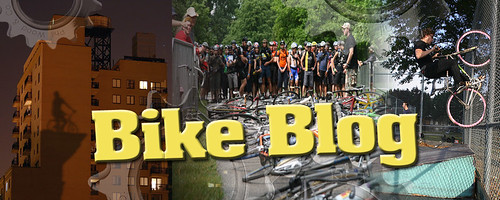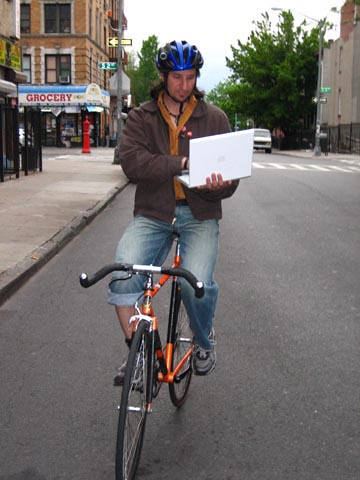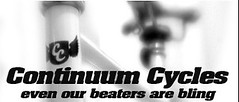Today a new ruling...
NY Newsday-
Judge sides with bikers.
The city may have to rethink using its permit rule as a reason to arrest Critical Mass cyclists after the statute was deemed 'unconstitutional'
BY GRAHAM RAYMAN
STAFF WRITER
January 11, 2006
A criminal court judge in Manhattan has held that the city's main weapon in its campaign against the Critical Mass bicycle ride is unconstitutional.
Deciding the case of eight cyclists arrested in January 2005, Judge Gerald Harris wrote in a 17-page ruling that the city's parading without a permit statute is "overly broad" and "unconstitutional on its face."
The Police Department has been relying on the statute to make arrests in an effort over the past 18 months to rein in Critical Mass, a loosely organized bicycle ride that starts at Union Square and meanders through midtown streets one Friday evening each month.
More than 2,100 people have been arrested under the parading charge in the period, the majority during the 2004 Republican National Convention.
Police officials claim the rides disrupt traffic and threaten public safety. The department has sought to force the cyclists to get permits.
But ride advocates argue that the cyclists are merely part of traffic.
They also claim the rides are spontaneous, thus no organization exists to apply for a permit. They say the purpose is to bring attention to alternative forms of transportation.
Gideon Oliver, a lawyer representing the cyclists, acknowledged that the Monday ruling is not binding on the city because it came in criminal court.
But Oliver said, "What sets it apart is the fact that it came after a substantial trial. What remains to be seen is what the city will make of it."
The arrests in question took place on Jan. 28, 2005, at Fifth Avenue and 13th Street. The cyclists were charged with parading without a permit, failure to disperse and disorderly conduct.
The cyclists opted to take the case to trial to protest the crackdown.
"My honest feeling about this is that it's [the decision] a victory for us," said Tyler Hartz, 27, a defendant who now lives in Jackson Hole, Wyo. "We won just by going to trial because we were all prepared to take a guilty verdict to make the point."
Hartz, a hotel bellhop who spent $500 on airfare to return for the trial, said he hopes the city will relax the Critical Mass crackdown.
Harris did find the cyclists guilty of disorderly conduct, and set sentencing for next month.
A trial of another 30 cyclists arrested last year will begin later this month.
A police spokesman did not reply to an e-mail message seeking comment.
==============
This from Sarah Ferguson of the village voice:
Bikers Win One: Judge Nixes City Law on Parade Permits
By Sarah Ferguson | January 10, 2006
A judge late on Monday took a bite out of the city's efforts to rein in the monthly Critical Mass rides when he ruled that the New York City law barring people from "parading without a permit" is unconstitutional.
Police have been using the statute to make mass arrests during Critical Mass rides--and during the Republican Convention, they used it to round up all sorts of protestors. Yet on Monday, New York City Criminal Court Judge Gerald Harris ruled that the parade permit law is "hopelessly overbroad" and "constitutes a burden on free expression that is more than the First Amendment can bear."
Harris's ruling stems from a case involving eight cyclists who were arrested at a Critical Mass ride on January 28, 2005. They were charged with parading without a permit, blocking traffic, and failing to disperse.
Judge Harris upheld the charge of blocking traffic but threw out the other two charges, ruling that an order to disperse was never given and that the city’s parade permit law was "constitutionally invalid" because it fails to adequately define what a parade is, or to say what minimum number of people would be required to get a permit.
"Improbable though it may be, under the City's permit scheme as written, a person promenading, or two persons racing are conceivably required to obtain a permit from the City of New York," Harris wrote in his 17-page decision. "Similarly, a funeral procession, two or three cars displaying political posters traveling one behind the other, caravan style, or a small group of friends biking together could run afoul of the law."
Harris also faulted the parade law for failing to define intent. "Any person who unknowingly participates in a permitless march may be arrested, fined or imprisoned. Bystanders, onlookers, stirred by the passion evoked by a political march, join at their peril," he argued.
Prosecutors are deciding whether they will appeal, and this lower court ruling does not preempt the city's ongoing efforts to use the parade statute to obtain permanent injuctions against Critical Mass in state and federal courts.
Nevertheless, bike advocates were ecstatic. "We're very excited," said Dave Rankin of Free Wheels, a volunteer group founded to provide legal support to bicyclists arrested during Critical Mass rides. "This is what we've been saying all along--that the parade permitting scheme gives the police far too much discretion to decide what is a parade, and that they're arresting people at their whim."
Defense Attorney Gideon Oliver called the ruling "well-reasoned" and said he hoped it would "challenge the City to reconsider its aggressive stance toward policing First Amendment activities in general, and Critical Mass bicycle rides in particular."
Since August 2004, the city has arrested more than 2000 people for violating the parade permit law. According to Bruce Bentley of the National Lawyers Guild, the vast majority of the 1,806 people arrested during the Republican National Convention were charged with parading without a permit.
And since the RNC, cops have arrested nearly 350 more bicyclists for "parading without permit" during Critical Mass rides. Harris's decision is not binding on the 50 or so other bike arrest cases still pending before the courts. A trial of 30 bikers is scheduled to begin later this month.
Yet Oliver said the judges in those cases would at least have to consider Harris's ruling. "It certainly does have relevance in the context of cases that are before the criminal court," Oliver said.
Not surprisingly, the city's law department dismissed the decision as "erroneous," noting that two judges had found the parade permit law valid in three previous Critical Mass cases.
"This is the first decision to dismiss a criminal case on this basis, and we believe that it is erroneous," said City Attorney Sheryl Neufeld in a press statement. "Several Criminal Court judges have previously determined that the City's requirement that parades and processions obtain a parade permit does not violate the First Amendment rights of bicyclists who participate in Critical Mass rides. . . . This is the first judge who ruled to the contrary."











0 Comments:
Post a Comment
<< Home